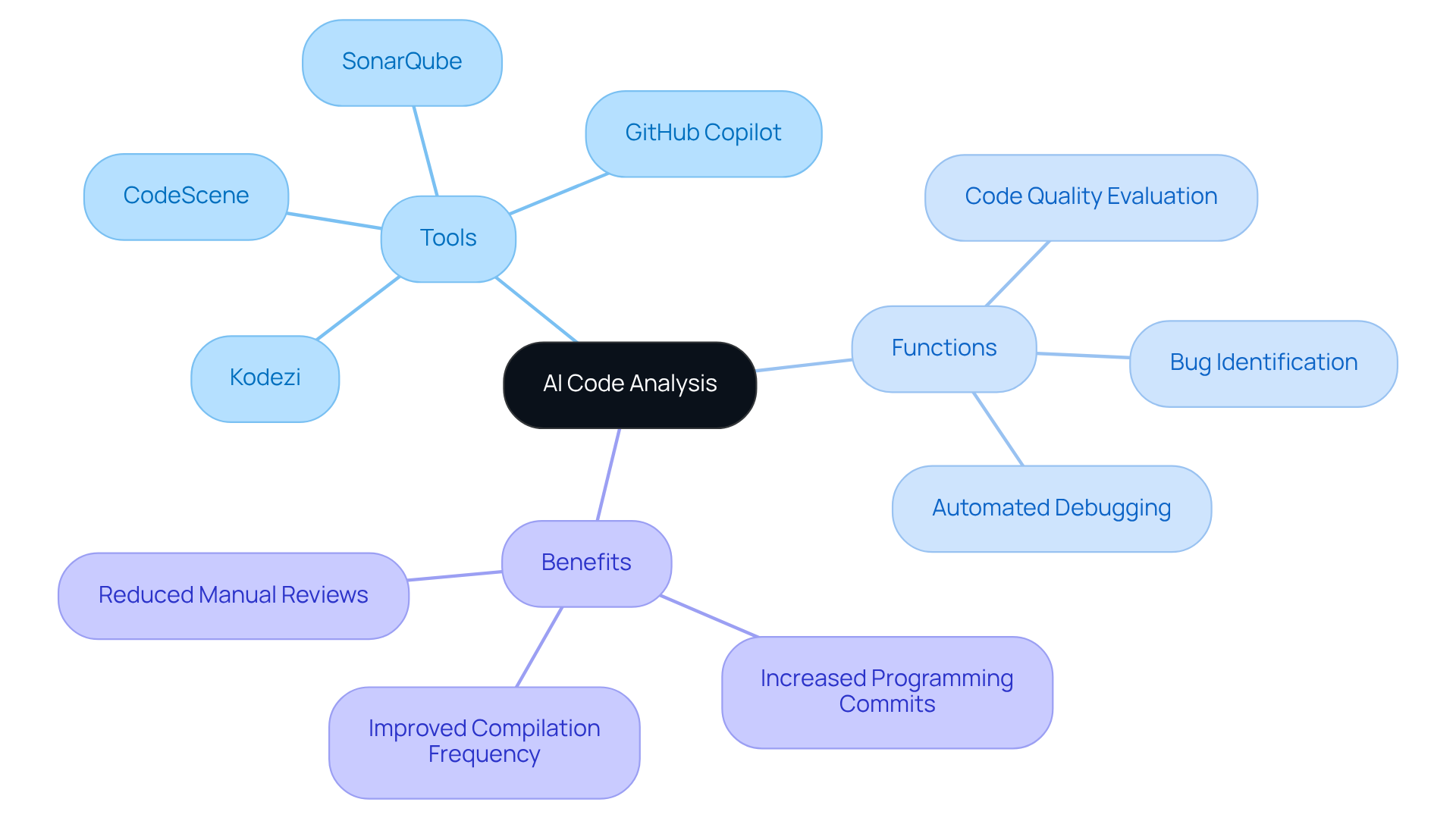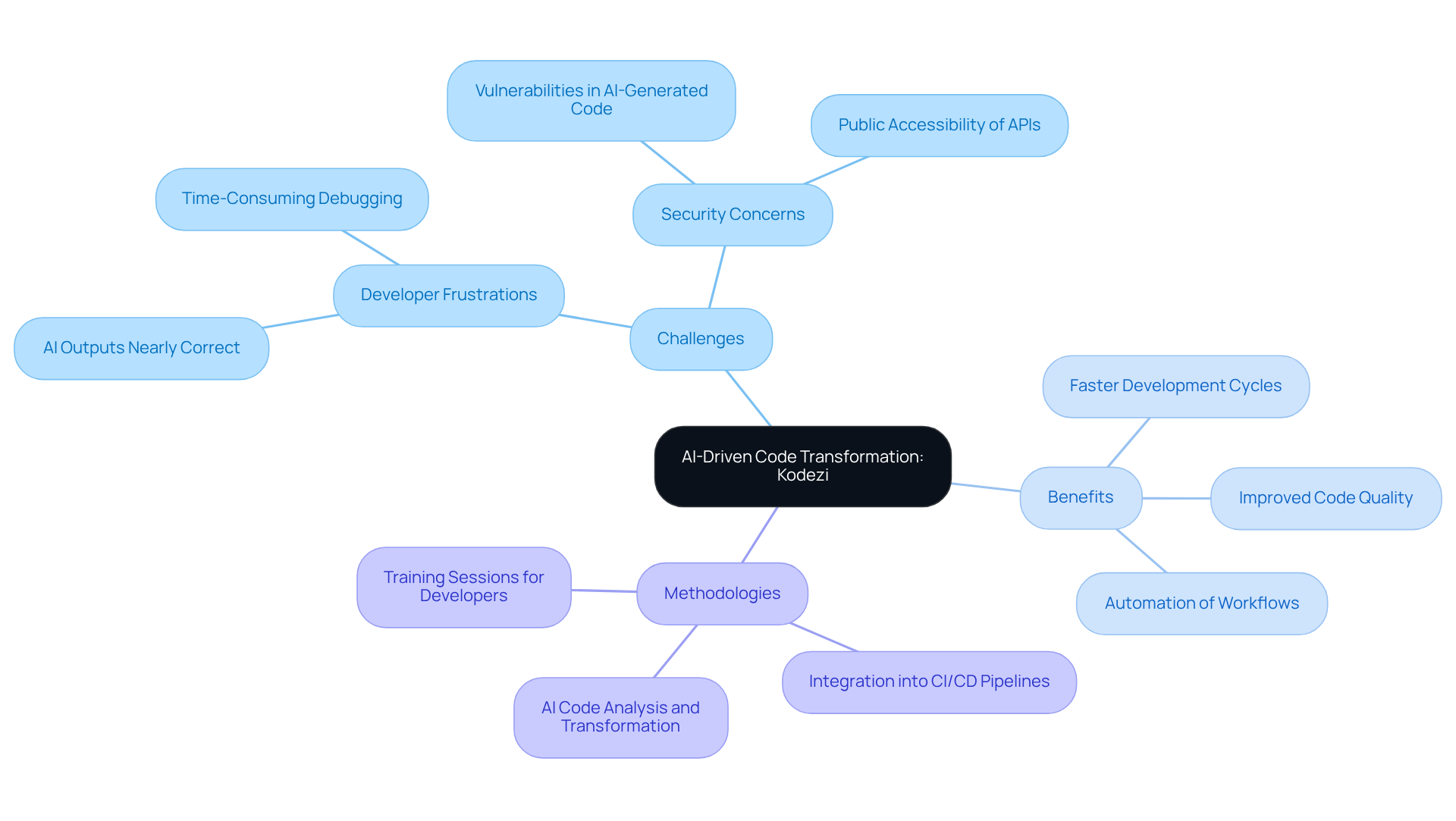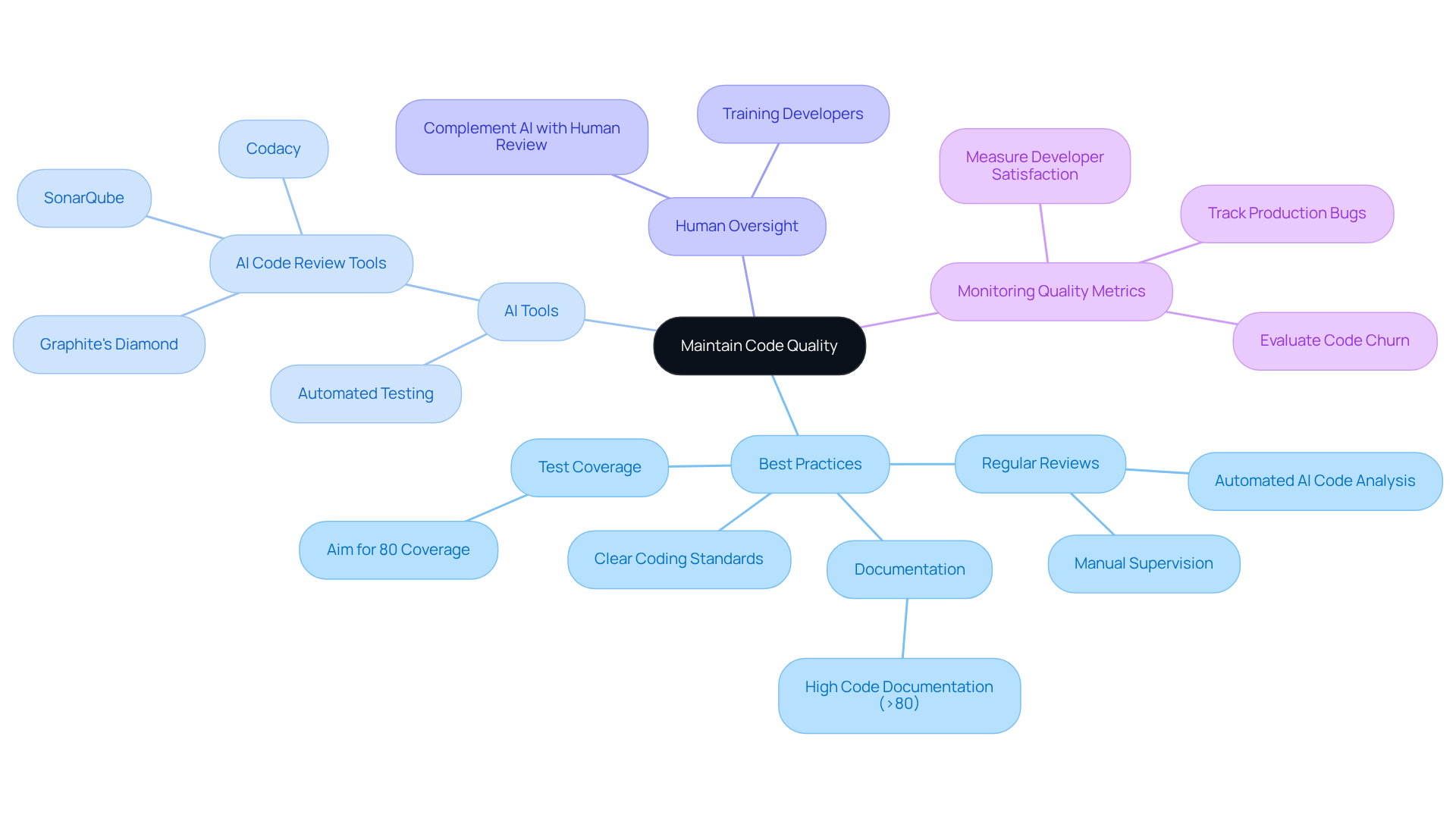Overview
Software developers often face significant challenges in coding, particularly with repetitive tasks and maintaining code quality. AI code analysis and transformation best practices can address these issues effectively. Tools like Kodezi streamline the coding process, offering essential insights and corrections that not only enhance productivity but also improve overall code quality.
How does Kodezi tackle these challenges? By automating repetitive tasks, Kodezi allows developers to focus on more critical aspects of their projects. This leads to faster development cycles and reduces the burden of manual code reviews. Furthermore, Kodezi's features provide real-time feedback, ensuring that developers can catch errors early in the process.
The benefits of using Kodezi are clear: improved productivity, enhanced code quality, and a more efficient development workflow. Imagine completing projects more quickly and with fewer errors—this is the potential that Kodezi unlocks for developers. In addition, leveraging such tools can significantly reduce stress and increase job satisfaction.
Explore the tools available on the Kodezi platform and see how they can transform your coding experience. Are you ready to enhance your software development efficiency? Kodezi is here to help you navigate the complexities of coding with ease.
Introduction
In the realm of software development, developers often face significant challenges due to the pressure to deliver high-quality code quickly. How can these challenges be effectively addressed?
The integration of AI code analysis and transformation tools, such as Kodezi, presents a compelling solution, streamlining workflows and enhancing code quality. Furthermore, as organizations increasingly adopt these technologies, a critical question arises: how can teams leverage AI while ensuring robust security and maintaining high standards?
This article delves into best practices for maximizing efficiency with AI-driven code analysis, exploring the tools and methodologies that can transform coding practices for the better. By utilizing Kodezi, developers can significantly improve productivity and code quality, ultimately leading to a more efficient development process.
Are you ready to explore the transformative tools available on this platform?
Understand AI Code Analysis: Importance and Fundamentals
In the fast-paced world of software development, developers often encounter significant coding challenges. How can these hurdles be overcome? AI code analysis and transformation, especially through tools like Kodezi, utilizes machine learning algorithms and natural language processing to evaluate code quality, identify bugs, and suggest improvements. This integration is crucial as it automates repetitive tasks, allowing developers to focus on more intricate challenges.
Kodezi exemplifies this by autonomously enhancing codebases and resolving issues before they reach production. Imagine a tool that not only saves time but also improves code quality—this is what Kodezi offers to B2B engineering teams. Fundamental aspects of AI code analysis and transformation include seamless integration with existing workflows and various types of analyses, such as static and dynamic analysis. For instance, Kodezi's automated debugging system promptly identifies and resolves issues, ensuring adherence to security best practices and programming standards.
Furthermore, tools like CodeScene, SonarQube, and GitHub Copilot provide valuable insights into complexity and maintainability. These insights assist teams in prioritizing refactoring initiatives, ultimately leading to improved productivity. By utilizing AI code analysis and transformation, teams can significantly reduce the burden of manual reviews, resulting in enhanced development speed and efficiency.
Recent studies suggest that organizations employing AI resources have experienced a 13.5% boost in weekly programming commits and a 38.4% increase in compilation frequency. These statistics highlight the tangible advantages of these technologies in practical applications. However, it is important to consider that 48% of AI-generated programs contain security vulnerabilities, underscoring the need for careful oversight in its use. Are you ready to explore how Kodezi can transform your coding practices?

Implement AI-Driven Code Transformation: Tools and Methodologies
In the world of software development, coding challenges can often impede progress. Developers frequently encounter issues that slow down their workflow and affect code quality. How can these challenges be effectively addressed? Enter Kodezi, an AI-assisted development resource that not only rectifies programming errors but also utilizes AI code analysis and transformation to enhance and troubleshoot code, making it suitable for developers at all levels.
Kodezi CLI stands out as a flexible tool for teams, allowing them to auto-repair codebases in moments. Furthermore, it effortlessly integrates into CI/CD pipelines, enabling continuous examination and modification of software. This means that developers can focus more on innovation rather than getting bogged down by repetitive issues.
What benefits can Kodezi offer? Organizations that have adopted AI code analysis and transformation, including Kodezi users, report that their development cycles are up to 30% faster. In addition, these teams experience significant enhancements in code quality. Imagine the productivity gains when automated workflows trigger AI code analysis and transformation with every pull request, providing immediate feedback and corrections.
However, it's important to acknowledge that developers often face frustrations with AI solutions. Research indicates that 66% of developers find AI outputs 'almost right, but not quite.' To combat this, training sessions focused on maximizing the use of these tools can further enhance team adoption and productivity. Moreover, evaluating potential security threats linked to AI-generated programs is crucial, as studies show that 48% of such outputs contain vulnerabilities.
In conclusion, Kodezi not only addresses common coding pain points but also significantly boosts productivity and code quality. Are you ready to explore the transformative potential of AI-driven software development tools like Kodezi?

Maintain Code Quality: Best Practices for AI Integration
In the ever-evolving landscape of software development, coding challenges are a common hurdle that developers face. To uphold software quality while embracing AI code analysis and transformation tools, teams should adopt several best practices. Establishing clear coding standards and guidelines that all team members must follow is crucial, as it ensures consistency across the codebase. As Claire Longo emphasizes, "AI review should complement rather than replace human reviewers," highlighting the importance of human oversight in maintaining quality.
Furthermore, executing regular reviews of programming that incorporate both automated AI code analysis and transformation, such as those offered by specific tools for bug analysis and automatic correction, along with manual supervision, is essential to identify problems that AI might overlook. The platform's capability to automatically rectify programming errors and offer thorough clarifications regarding issues improves this process. Similarly, employing AI applications such as Kodezi for continuous integration and deployment (CI/CD) automates testing procedures, guaranteeing that only high-quality software is deployed to production.
Observing the effectiveness of AI systems is crucial; teams should modify settings to reduce incorrect positives and negatives. For example, tools such as SonarQube can monitor quality metrics over time, allowing for proactive maintenance and enhancement. Research shows that groups with extensive documentation (over 80%) and nearly complete test coverage (80% and above) encounter considerably fewer production bugs and improved reliability. By following these best practices, teams can effectively utilize AI-driven automated builds and testing features, as well as AI code analysis and transformation, while ensuring their code remains clean, compliant, and production-ready. Kodezi's focus on being an autocorrect tool, rather than an autocomplete tool like Copilot, further distinguishes it in the market.
Are you ready to enhance your coding practices? Explore the tools available on the Kodezi platform to improve productivity and code quality today.

Conclusion
In today's fast-paced software development landscape, developers face numerous coding challenges that can hinder productivity and code quality. Embracing AI code analysis and transformation is essential, as it significantly enhances these aspects. Tools like Kodezi address these challenges by automating repetitive tasks, allowing developers to focus on more complex issues. This shift not only streamlines workflows but also ensures compliance with industry standards and security protocols.
Furthermore, the integration of AI within development processes highlights its importance in identifying bugs, suggesting improvements, and facilitating seamless integration. Organizations that adopt AI-driven tools report substantial improvements in development speed and a marked increase in programming efficiency. However, it is crucial to maintain human oversight and adhere to best practices to mitigate potential security vulnerabilities associated with AI-generated code.
As the software development landscape evolves, leveraging AI tools like Kodezi can transform coding practices and drive significant advancements in productivity. Teams are encouraged to explore these innovative solutions and adopt a proactive approach to integrating AI into their workflows. By doing so, they can remain at the forefront of technological progress while ensuring high standards of code quality.
Frequently Asked Questions
What is AI code analysis and why is it important?
AI code analysis utilizes machine learning algorithms and natural language processing to evaluate code quality, identify bugs, and suggest improvements. It is important because it automates repetitive tasks, allowing developers to focus on more complex challenges.
How does Kodezi contribute to AI code analysis?
Kodezi autonomously enhances codebases and resolves issues before they reach production, saving time and improving code quality for B2B engineering teams.
What types of analyses are included in AI code analysis?
AI code analysis includes various types of analyses such as static and dynamic analysis, which help ensure adherence to security best practices and programming standards.
What are some other tools used in AI code analysis?
Other tools that provide valuable insights into code complexity and maintainability include CodeScene, SonarQube, and GitHub Copilot.
How does AI code analysis affect productivity?
By utilizing AI code analysis, teams can significantly reduce the burden of manual reviews, leading to enhanced development speed and efficiency, and ultimately improved productivity.
What are the statistics regarding organizations that use AI resources in programming?
Organizations employing AI resources have experienced a 13.5% boost in weekly programming commits and a 38.4% increase in compilation frequency.
Are there any risks associated with AI-generated programs?
Yes, it is important to note that 48% of AI-generated programs contain security vulnerabilities, highlighting the need for careful oversight in their use.




